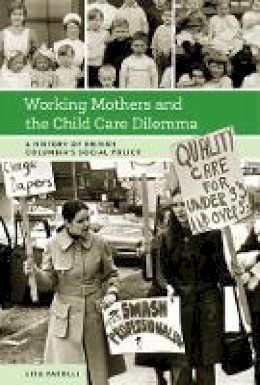
Working Mothers and the Child Care Dilemma: A History of British Columbia’s Social Policy
Lisa Pasolli
During the twentieth century, child care policy in British Columbia matured in the shadow of a political uneasiness with working motherhood. Working Mothers and the Child Care Dilemma examines how ideas about motherhood, paid work, and social welfare influenced universal child care discussions and consistently pushed access to child care to the margins of BC’s social policy agenda. Charting the growth of the child care movement in this province, Lisa Pasolli examines the arrival of Vancouver’s first crèche in 1912, the teetering steps forward during the debates of the interwar years, the development of provincial child care policy, the rebellious advancements of second-wave feminists in the 1960s and 1970s, and the maturation of provincial and national child care politics since the mid-70s. In addition to revealing much about historical attitudes toward women’s roles, Working Mothers and the Child Care Dilemma celebrates the efforts of mothers and advocates who, for decades, have lobbied for child care as a central part of women’s rights as workers, parents, and citizens.
Product Details
About Lisa Pasolli
Reviews for Working Mothers and the Child Care Dilemma: A History of British Columbia’s Social Policy
Rachel Langford, Ryerson University
Pacific Historical Review
Much more than connecting the chronological dots (which is itself an important achievement), Pasolli provides an analytical explanation for the rather discouraging continuities that shaped decades of public debate and marginalized the childcare and employment needs of women and families … A smart book on an issue we continue to wrestle with, and the sole monograph on the topic from a historian’s perspective, it will find its way on to many bookshelves.
Esyllt W. Jones, University of Manitoba
BC Studies
To assemble this impeccable book, Lisa Pasolli has formulated impressive questions … Readers … will be interested to discover how contemporary debates over the importance of early education, and over the educational disadvantages of parents and workers who bore the consequences of the deficiencies of child care, became part and parcel of The Child Care Dilemma.
Dominique Marshall, Carleton University
Historical Studies in Education
